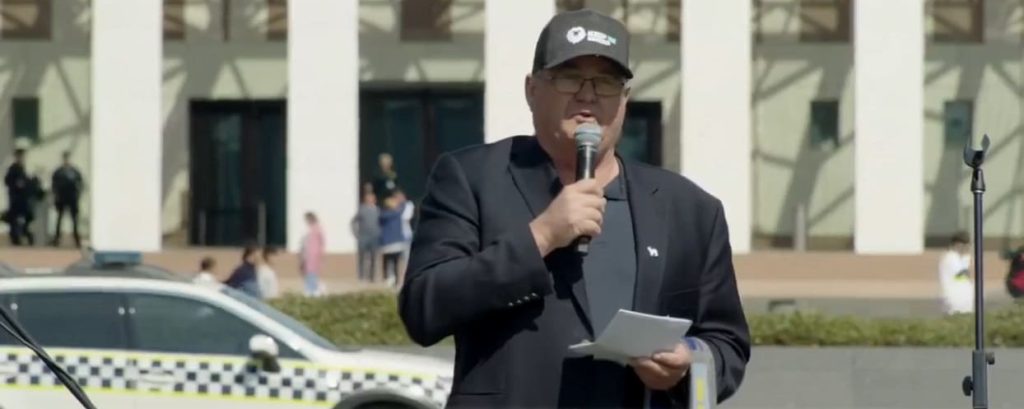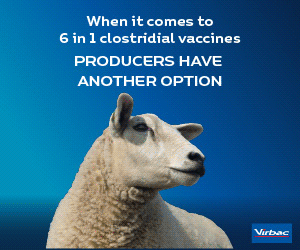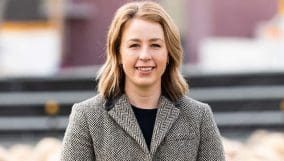
Former WAFarmers president and Keep the Sheep spokesman John Hassell speaks at a rally in Cenberra.
LIVE sheep export by sea proponents unbowed by the Coalition’s loss in the federal election believe a majority Albanese Labor Government now had a chance to change its mind on phasing out the trade by 1 May 2028.
Keep the Sheep spokesman and National Farmers Federation vice president John Hassell said the movement would keep going despite the Coalition losing its chance to carry out its promise to repeal the phaseout legislation.
However, Mr Hassell said the ALP could “comfortably” backflip on its live sheep trade phaseout policy.
 “One would hope they are reasonable people.
“One would hope they are reasonable people.
“My guess is that they (the ALP) don’t have to pander to anybody now, they don’t have to appease anybody nor worry about any seats,” he said.
“They could quite comfortably go and tell the Animal Justice Party that their kind of politics isn’t what we need in our lives and they could change their mind.
“They (the ALP) has backflipped on lots of things and we’ve asked them to backflip on this; we don’t know whether they will or not, but we’ve asked them to, and it certainly can’t hurt to ask again,” Mr Hassell said.
“If they are reasonable people, they’ve got a good majority now, they have to pander to anybody and this is a good opportunity to actually do the right thing by the history of the Labor party and by history of the Australia people – Australia grew on the sheep’s back – and to support industry that supports regional towns.”
Mr Hassell said regional towns are struggling and the policy would kill some of them.
“The effect of announcing the ban without stating the date has had a devastating effect on some communities already. In mental health, employment and terms of trade.”
He said there was also a case for the government to improve the transition package.
“But if they really genuinely want to do the right thing then reverse the (phaseout) decision and stop pandering to minorities.
“They have an opportunity to reverse a really bad decision.”
Keep the Sheep is an initiative of Farming Families and Communities WA Ltd and Mr Hassell said the company is not going away and would still work on a number of options, including a class action.
Mr Hassell said people handing out Labor how-to-vote cards at WA polling booths told Keep the Sheep supporters standing beside “put Labor Last’ placards they thought the trade phaseout was a bad policy, indicating internal Labor membership support.
Mr Hassell believed the Keep the Sheep campaign had some impact in WA seats by reducing the swing to Labor and in two eastern states seats, Wannon where KTS lobbied against independent Alex Dyson and in Bendigo against Labor incumbent Lisa Chesters. The result in the new WA seat of Bullwinkel, which was a focus of Keep the Sheep, is also close between Labor’s Trish Cook and Liberal Matt Moran.
“Perhaps the Labor Party should take notice of that, be reasonable and we’ll pack our bags and go home.
“Bullwinkel was notionally a Labor seat and they are going to struggle to hang onto it.”
Mr Hassell said he did not regret focusing the Keep the Sheep campaign on politically supporting the repeal of the phaseout decision rather than on lobbying for an increase the Albanese Government’s $139.7 million transition package.
“Not at all, because the transition package won’t save our small regional towns.
“Our campaign has been about communities, not about farmers.”
Mr Hassell said he would also love to see a government inquiry into fringe benefits tax, which has also had a devastating impact on regional communities.
Live sheep policy not core Labor business – ALEC

Australian Livestock Exporters’ Council CEO Mark Harvey-Sutton
Australian Livestock Exporters’ Council chief executive officer Mark Harvey-Sutton said it was always understood that the Keep the Sheep campaign achievements might be limited to the WA seat where live sheep export was an issue.
He said the campaign was always aware that the parties supporting the trade and Keep the Sheep – the Coalition, the Nationals and One Nation – had to be successful to achieve a change of government.
“It was actually a really incredible effort by everyone, particularly the volunteers, and it showed there was so much frustration with the phaseout policy that people wanted an avenue to do something about it.
“Because the one thing that doesn’t change, regardless of the election outcome, is the fact that the policy is stupid,” he said.
“Certainly from an ALEC perspective we will certainly be taking every opportunity to point that out.”
Mr Harvey-Sutton said the campaign now needed to take stock and think about what it does next.
He said the government’s live sheep policy is doing real damage in WA, and if the campaign stepped back at all from its aim to repeal the phaseout legislation Keep the Sheep would be doing the wrong thing by the sheep sector and the broader agricultural industry.
Mr Harvey-Sutton said at a Tangney electorate booth a Labor member also expressed sympathy for the Keep the Sheep campaign.
“I think that says that this policy is not core to Labor’s business and I think there is actually a large swathe of people, even if they are Labor voters, who would still be very supportive of the farmers.
“I think that is a very interesting perspective to look at and I think if shows that the campaign has worked to some extend as well, because people are understanding of the damage it is doing,” he said.
“We are not going to stop pursuing it.”
Mr Harvey-Sutton noted that Bullwinkle was too close to call.
“If you put that within the context of a large swing to Labor – that hasn’t been replicated in that seat and that would be because of Keep the Sheep.”
He said election result might mean an escalated interest in a class action, but this was yet to be determined.
“I think we just have to assess where we are at, but I certainly wouldn’t be ruling that out because we are seeing the real impacts of the policy happening right now.
“I think everything is on the table still, but there is a lot that we have to look at before we determine our strategy.”
Alliance confident Albanese will follow through
Australian Alliance for Animals co-founder and director, strategy, Dr Bidda Jones said the alliance was very pleased to see the re-election of an Albanese Labor Government.
“The Albanese Government was strong on animal welfare in its first term, passing legislation to phase out the cruel live sheep export trade, establishing the Inspector-General of Animal Welfare and Live Animal Exports, and renewing the Australian Animal Welfare Strategy.”
She said the 2025 election campaign has seen Labor commit to a new suite of animal welfare policies, including:
- seeing through the phase out of live sheep exports by 1 May 2028
- expanding the role of the Inspector-General of Animal Welfare and Live Animal Exports to include export abattoirs
- prioritising and investing in the implementation of the Australian Animal Welfare Strategy (AAWS)
- developing an animal welfare trade policy and seeking to include animal welfare provisions in new trade agreements
- expanding the ban on importing hunting trophies to include the top 20 most hunted exotic species and
- considering reform options recommended by the Productivity Commission to expand tax deductible gift recipient status to a broader range of animal welfare advocacy charities.
Dr Jones said these commitments were very well received by our members and the Australian public during the election campaign.
“Our dealings with the Albanese Government indicate that they are unwavering in their support for the phase out of live sheep exports, and there is nothing in this election result to suggest that this might change – quite the opposite, especially given Labor’s strong results in WA.
“We expect the government to continue its focus on rolling out the $139.7 million transition assistance package and we hope that farming groups will now shift their focus to the opportunities this provides for WA producers.”
When asked if the alliance might now push to extend the live export ban to cattle, Dr Jones said the alliance’s focus now is squarely on working with the Albanese Government and the new parliament to ensure the timely implementation of their commitments.
“In particular, we’re keen to see early progress on investing in the AAWS and securing legislation to expand oversight of the regulation of export abattoirs.”
Sheep producers must get adequate support – SPA

SPA CEO Bonnie Skinner.
Sheep Producers Australia chief executive officer Bonnie Skinner said the body’s job hasn’t changed with the election result.
“Our job is to work with the government of the day on behalf of the nation’s sheep producers.
“We remain committed to providing government with advice focused entirely on the well-being of our industry and members,” she said.
“We are working to ensure sheep producers, their families and communities receive adequate support for this unwanted transition.
“Last year Prime Minister Anthony Albanese said rural communities wouldn’t be left behind as Labor pushed forward with this legislation – we must continue to ensure this is the case.”
Ms Skinner said election result is an opportunity for improvements to the current package and to make it more targeted.
“It’s not set in stone – programs aren’t open yet.
“There’s also an industry stocktake – an evaluation on the transition process – scheduled for 2026-27,” she said.
“This will be another critical date for industry to provide feedback about the adequacy of the transition rollout.
“But one thing is clear, money from the transition package must start flowing now to those who need it most. This is critical,” Ms Skinner said.
“Many West Australian sheep producers are making decisions now and the transition package – including funding – is vital in assisting with these decisions and enabling producers to make the best decisions for their businesses.
“Keep the Sheep has done an amazing job raising awareness about the effects of the phase out of live sheep exports by sea on families and Western Australian communities.”

Watt has never talked to farmers in Western Australia. That might make a bad photo op or sound bite. In his whole time as ag monster he never came to Woolarama; every ag minister I can remember has. Barnaby was a regular.
Murry Watt was sniggering away about turbines and live export on Saturday night on Sky News. He hates rural farming people so much. Even said the rural people he talks to want turbines and powerlines. Yeah maybe three or four hosts, and then 50 or a hundred-odd neighbors that don’t. Let alone the ugly crappy Chinese-built poles. As for the 3000 odd jobs in regional Western Australia… I notice he doesn’t go anywhere to that side of country.